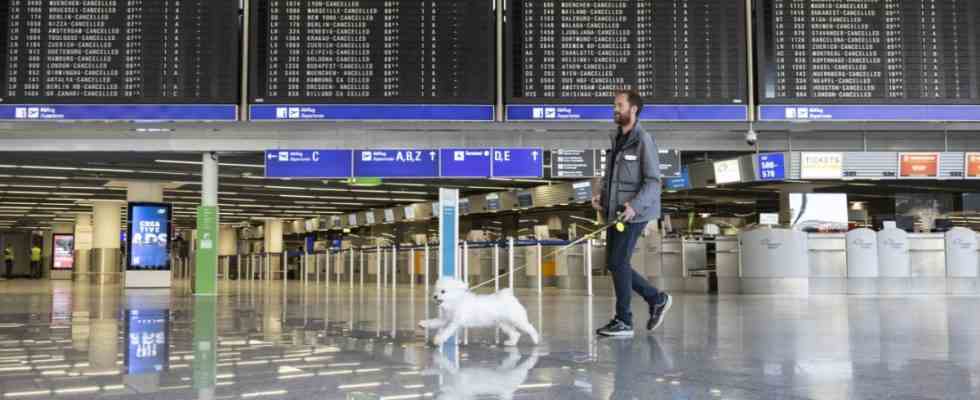Millions of people in Germany were hit by the warning strike on the train, in local public transport and at airports. Deutsche Bahn stopped long-distance traffic for Monday. The railway and transport union (EVG) had called for the warning strike together with Verdi. According to the EVG, more than 30,000 employees at 350 locations took part by early morning.
Airports and local public transport in the seven federal states of Bavaria, Baden-Württemberg, North Rhine-Westphalia, Hesse, Saxony, Lower Saxony and Rhineland-Palatinate are also on strike, so that trains are no longer running in large parts of regional and S-Bahn traffic.
According to DB, whether individual connections will be started in regional traffic in the afternoon depends on the course of the strike. However, the effects should still be felt on Tuesday. According to Bahn, passengers who have booked a trip for Monday or Tuesday can use the ticket flexibly until April 4th. Seat reservations can be canceled free of charge.
“Millions of passengers who depend on buses and trains are suffering from this exaggerated, exaggerated strike,” said a railway spokesman in Berlin in the morning. “Not everyone can work from their home office.” Thousands of companies in the economy who received or sent their goods by rail would also have disadvantages: “The winners of the day are the mineral oil companies.”
Nothing works at the airports on Monday either
Except for the capital airport BER, the airports in Germany are practically paralyzed. The two largest airports, in Frankfurt and Munich, like many others, have stopped regular passenger traffic. There was already a strike at the airport in the Bavarian state capital on Sunday, and all of the originally planned 1,500 connections were canceled on both days. According to the Federal Association of the German Aviation Industry (BDL), 380,000 passengers across Germany are affected by the industrial action on Monday.
The aim of the 24-hour industrial action is to increase the pressure on employers in collective bargaining. Verdi has called around 120,000 employees in the transport and infrastructure sector to strike – also in municipal ports, at locks, in the water and shipping administration and at the motorway company.
Parallel to the strike, trade unions and employers in the public sector will meet again this Monday for talks. At the EVG, further negotiations with Deutsche Bahn and other railway companies will take place later. Verdi boss Frank Werneke emphasized: “The strike day in the transport sector should once again make it unmistakably clear to employers that the employees clearly support our demands.”
The next round of negotiations is scheduled for Monday to Wednesday in Potsdam
The EVG is negotiating for around 230,000 employees at 50 train and bus companies, for whom they want twelve percent more wages, but at least 650 euros more per month. Verdi is negotiating for the approximately 2.5 million public sector employees at the federal and local governments, including those working in local transport and at airports. The union demands 10.5 percent more, but at least 500 euros per month. “For many thousands of employees, it is a question of existence whether there are decent salary increases,” said Verdi boss Frank Werneke picture on sunday. He spoke of the biggest strike since 1992.
The next round of negotiations is scheduled for Monday to Wednesday in Potsdam. The German district association expects difficult wage negotiations because of the major strike. “Such demonstrations of power during ongoing negotiations clearly overshoot the target,” said the President, Ostholstein District Administrator Reinhard Sager (CDU). Editorial network Germany.
The German Association of Towns and Municipalities warned of a financial overload on the municipalities and predicted higher burdens for the citizens. Association general manager Gerd Landsberg said Picture (Monday), many municipalities would have to raise garbage fees or property taxes. In addition, many municipalities could invest less money in the renovation of school buildings in the future.

